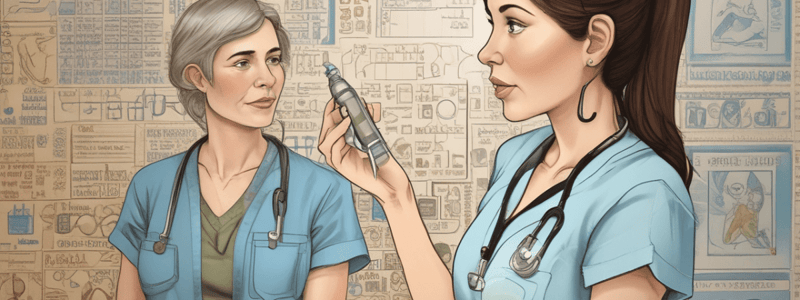Podcast
Questions and Answers
What indicates the client with newly diagnosed Type 1 diabetes needs more teaching about insulin therapy?
What indicates the client with newly diagnosed Type 1 diabetes needs more teaching about insulin therapy?
- The client drinks orange juice when experiencing a headache or nervousness.
- The client receives a glucagon injection at home if they pass out.
- The client checks their blood glucose with a glucometer at least once a day.
- The client does not worry about diet while taking insulin daily. (correct)
What laboratory test result would the nurse review to obtain information on the patient's past glucose control?
What laboratory test result would the nurse review to obtain information on the patient's past glucose control?
- Potassium level
- Urinalysis
- Glycosylated hemoglobin level (correct)
- Fasting glucose level
What should the nurse prioritize when administering insulin lispro to a client diagnosed with diabetes?
What should the nurse prioritize when administering insulin lispro to a client diagnosed with diabetes?
- Administering the dose according to the regular insulin sliding scale.
- Assessing the client for signs of hyperosmolar, hyperglycemic, non-ketotic syndrome.
- Ensuring the client is wearing a medical alert bracelet. (correct)
- Ensuring the client eats the food on the meal tray.
Which assessment data indicates a client with Type 1 diabetes is adhering to their medical treatment regimen?
Which assessment data indicates a client with Type 1 diabetes is adhering to their medical treatment regimen?
What indicates the client understands the teaching concerning insulin storage?
What indicates the client understands the teaching concerning insulin storage?
What is a priority intervention for the nurse caring for a client with newly diagnosed Type 1 diabetes?
What is a priority intervention for the nurse caring for a client with newly diagnosed Type 1 diabetes?
What should the nurse assess in a client with Type 1 diabetes who is taking insulin lispro?
What should the nurse assess in a client with Type 1 diabetes who is taking insulin lispro?
What is the primary goal of teaching a client with Type 1 diabetes about insulin therapy?
What is the primary goal of teaching a client with Type 1 diabetes about insulin therapy?
What is the priority action for the nurse to take if the patient with Type 2 diabetes complains of blurred vision and irritability?
What is the priority action for the nurse to take if the patient with Type 2 diabetes complains of blurred vision and irritability?
Which of the following insulins can be administered IV as an 'insulin drip'?
Which of the following insulins can be administered IV as an 'insulin drip'?
What is the primary reason for the patient to eat when or shortly after taking Humalog insulin?
What is the primary reason for the patient to eat when or shortly after taking Humalog insulin?
What does a glycosylated hemoglobin (A1c) level indicate?
What does a glycosylated hemoglobin (A1c) level indicate?
Which medication is most likely to cause a vaginal yeast infection as a side effect?
Which medication is most likely to cause a vaginal yeast infection as a side effect?
Why should the patient with diabetes avoid drinking alcohol?
Why should the patient with diabetes avoid drinking alcohol?
What is the primary advantage of carbohydrate counting in the diet of a patient with diabetes?
What is the primary advantage of carbohydrate counting in the diet of a patient with diabetes?
What is the duration of action for insulin glargine?
What is the duration of action for insulin glargine?
Why should the patient with diabetes store unopened insulin vials in the refrigerator?
Why should the patient with diabetes store unopened insulin vials in the refrigerator?
What is the primary reason for the patient to take Glyburide?
What is the primary reason for the patient to take Glyburide?
What type of insulin has a more rapid onset, peak, and duration of action than short-acting regular insulin?
What type of insulin has a more rapid onset, peak, and duration of action than short-acting regular insulin?
What is the goal of lowering hemoglobin A1C?
What is the goal of lowering hemoglobin A1C?
What is essential for the patient to understand before being discharged?
What is essential for the patient to understand before being discharged?
Why is it important to eat a mid-afternoon snack when taking NPH insulin?
Why is it important to eat a mid-afternoon snack when taking NPH insulin?
What is the correct order of drawing up insulin into a syringe?
What is the correct order of drawing up insulin into a syringe?
What is the duration of action of glargine insulin?
What is the duration of action of glargine insulin?
What is the mechanism of action of metformin?
What is the mechanism of action of metformin?
Why is repaglinide known as the 'Humalog of oral hypoglycemic drugs'?
Why is repaglinide known as the 'Humalog of oral hypoglycemic drugs'?
When should glipizide be administered in relation to meals?
When should glipizide be administered in relation to meals?
What should be done first when hypoglycemia is suspected?
What should be done first when hypoglycemia is suspected?
Which of the following is a rapid-acting insulin with an onset of action of less than 15 minutes?
Which of the following is a rapid-acting insulin with an onset of action of less than 15 minutes?
What information is essential to include in patient teaching before discharge from the hospital for a patient with newly diagnosed Type 1 diabetes?
What information is essential to include in patient teaching before discharge from the hospital for a patient with newly diagnosed Type 1 diabetes?
Which information should be included in a teaching plan for patients taking oral hypoglycemic drugs?
Which information should be included in a teaching plan for patients taking oral hypoglycemic drugs?
When should the nurse provide instructions to the patient about prefilled insulin syringes?
When should the nurse provide instructions to the patient about prefilled insulin syringes?
What should the nurse tell the patient with diabetes to best explain how Metformin works?
What should the nurse tell the patient with diabetes to best explain how Metformin works?
Which of the following is a long-acting insulin that mimics natural, basal insulin with no peak action and a duration of 24 hours?
Which of the following is a long-acting insulin that mimics natural, basal insulin with no peak action and a duration of 24 hours?
What is the primary goal of teaching a patient about insulin glargine?
What is the primary goal of teaching a patient about insulin glargine?
Which of the following is a characteristic of glipizide?
Which of the following is a characteristic of glipizide?
When is the patient at highest risk of hypoglycemia following an 8:00 AM dose of NPH insulin?
When is the patient at highest risk of hypoglycemia following an 8:00 AM dose of NPH insulin?
What should the nurse prioritize when teaching a patient about insulin administration?
What should the nurse prioritize when teaching a patient about insulin administration?
Flashcards are hidden until you start studying
Study Notes
Insulin Therapy
- Insulin therapy requires adherence to a specific diet, carbohydrate counting is recommended by the American Diabetic Association.
- Unopened insulin vials should be stored in the refrigerator to maintain their strength and potency.
Laboratory Tests
- Glycosylated hemoglobin (HbA1c) level detects glucose bound to red blood cells, indicating glycemic control over 2-3 months.
- Fasting glucose level indicates current glucose control.
Insulin Administration
- Rapid-acting insulin (e.g., lispro, aspart, glulisine) should be administered immediately before a meal.
- Long-acting insulin (e.g., glargine, detemir) has a slower onset and longer duration of action.
- Regular insulin can be administered IV as an "insulin drip".
Diabetes Management
- A patient with Type 2 diabetes should adhere to a diabetic diet and exercise regularly to control blood glucose levels.
- A patient with Type 1 diabetes should understand how to use a portable blood glucose monitor, recognize and treat signs and symptoms of hypoglycemia and hyperglycemia, and understand insulin administration.
Hypoglycemia
- NPH insulin peaks around 2-3 pm, so patients should eat a mid-afternoon snack to prevent hypoglycemia.
- Hypoglycemia prevention, symptoms, and treatment should be taught to patients with diabetes.
Oral Hypoglycemic Drugs
- Oral hypoglycemic drugs must be taken on a daily scheduled basis to maintain euglycemia and prevent long-term complications of diabetes.
- Limiting alcohol consumption, reporting symptoms of anorexia and fatigue, and notifying a healthcare provider if blood glucose levels rise above the target level are important for patients taking oral hypoglycemic drugs.
Insulin Types
- Insulin glargine is a long-acting insulin with no peak, lasting 24 hours.
- Insulin aspart is a rapid-acting insulin.
- NPH insulin is an intermediate-acting insulin.
Medications
- Metformin reduces glucose production by the liver and enhances insulin sensitivity.
- Glipizide should be taken 30 minutes before meals to stimulate insulin secretion.
- Repaglinide is a rapid-acting oral hypoglycemic drug that allows patients to take the drug with meals and skip a dose when skipping a meal.
- Empagliflozin is an SGLT-2 inhibitor that increases the risk of urinary and genital complications, especially genital mycotic infections.
Nursing Interventions
- When a patient with diabetes complains of blurred vision and irritability, the nurse should first check the patient's blood glucose level.
- The nurse should teach patients about insulin administration, hypoglycemia prevention, symptoms, and treatment, and provide instructions on how to use a portable blood glucose monitor.
Studying That Suits You
Use AI to generate personalized quizzes and flashcards to suit your learning preferences.




